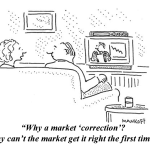“The Future Is Uncertain”
Part 2 Insights
T HE F U T U R E IS U N CE RT A IN – P A R T 2
April 2025
“Doubt is not a pleasant condition, but certainty is absurd” —Voltaire
Covid started 5 years ago. At the time, the future was cloudy, confusing and “more uncertain” Day by day, week by week and month by month the pandemic gave way to normalcy. The world appeared more normal until Liberation Day. The process of correcting perceived unfair trade practices and the resultant economic tool of tariffs to right a perceived wrong. The equity market reacted violently towards the potential and increased probability of recession and inflation.
But, is this environment “more uncertain”? No. The future is always uncertain, even when things seem to be going well. During times of increased uncertainty or challenges, it is best to remember certain long-term principles regarding risk management. Perhaps the singular best definition of risk is “more things can happen than will happen” (Elroy Dimson). 
Emotional Triggers
The feeling of uncertainty creates automatic triggers of fear, stress and flight that is automatically sent to the brain. The flight response has been helpful and important for survival when chased by a “bear”. The study of neuro-economics and “fear” has proven that natural condition is predisposed
- the fixation on the negative
- the sensitivity to social signals
- impairment of mental flexibility
Principle #7 is Control the Controllable
The future feels more certain right before “new events” whether its Covid, 9/11 or potential Trade Wars. Seth Klarman, the founder of Baupost, describes what can and cannot be controlled in investing, the following is an excerpt from the 2005 fund letter: For most investments, much can go wrong, including numerous factors beyond an investor’s control: the economy, the markets, interest rates, the dollar, war, politics, tax rates, new technology, labor problems, competition, litigation, natural disasters, fraud, dilution, accounting gimmicks, and corporate mismanagement. Some but not all of these risks can be hedged, often only imprecisely and always at some cost. Other factors are under an investor’s control, but are not always controlled: discipline; consistency; remaining with your circle of competence; matched duration of client capital with underlying investments; prudent diversification; reacting rationally to news or market developments; and of course, not overpaying. Success will be earned in controlling the controllable elements. And 5 years later, not worried about covid….but now Trade War?





